Cross-Cultural Issues Faced by Experts in Managing New Teams in Singapore
VerifiedAdded on 2023/06/16
|15
|4989
|102
AI Summary
This essay discusses the cross-cultural issues faced by experts in managing new teams in Singapore and provides suggestions to overcome them. It also explores the way parent company in U.S.A could manage expatriate assignment in the most effective manner with context of selection, training and rewards.
Contribute Materials
Your contribution can guide someone’s learning journey. Share your
documents today.
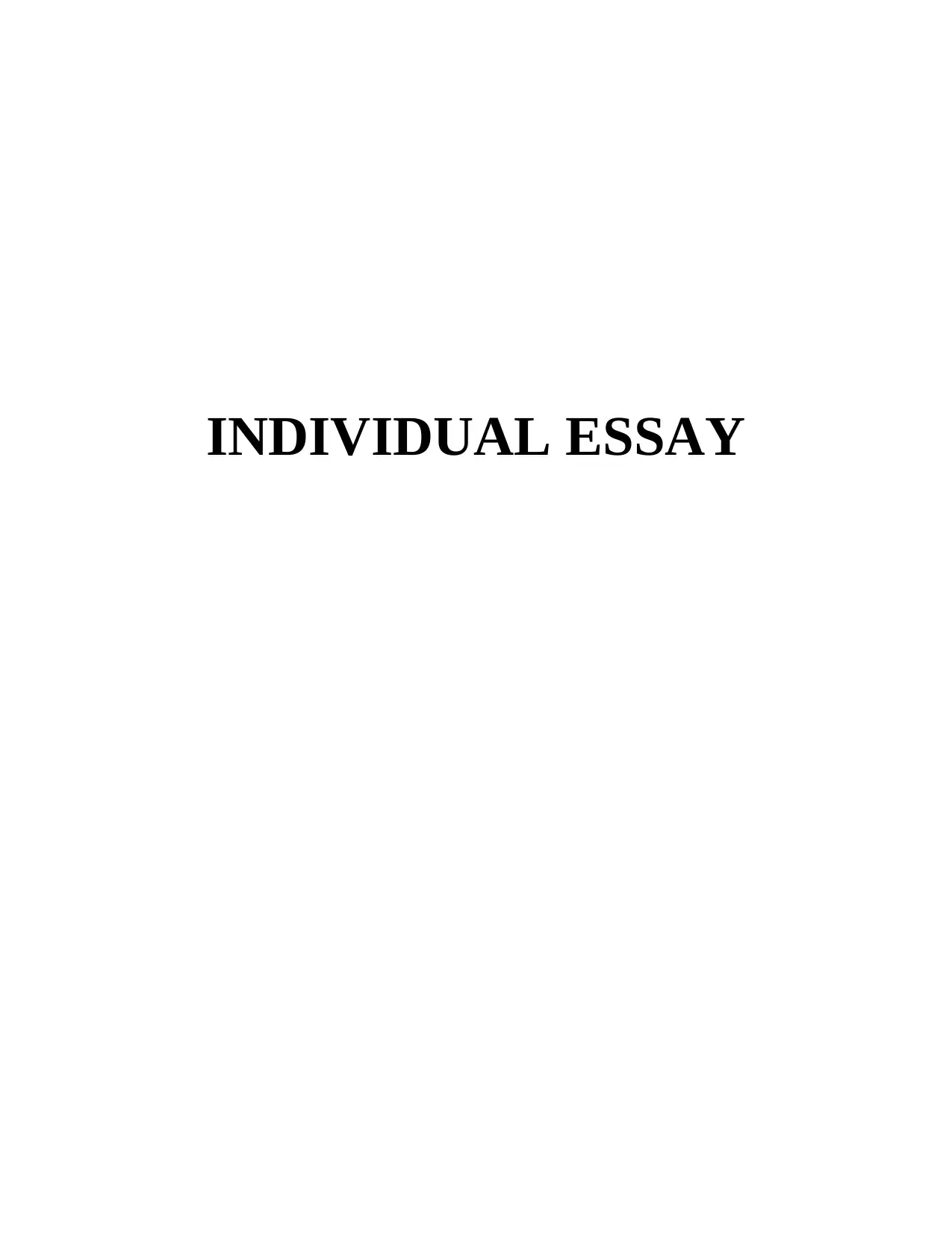
INDIVIDUAL ESSAY
Secure Best Marks with AI Grader
Need help grading? Try our AI Grader for instant feedback on your assignments.
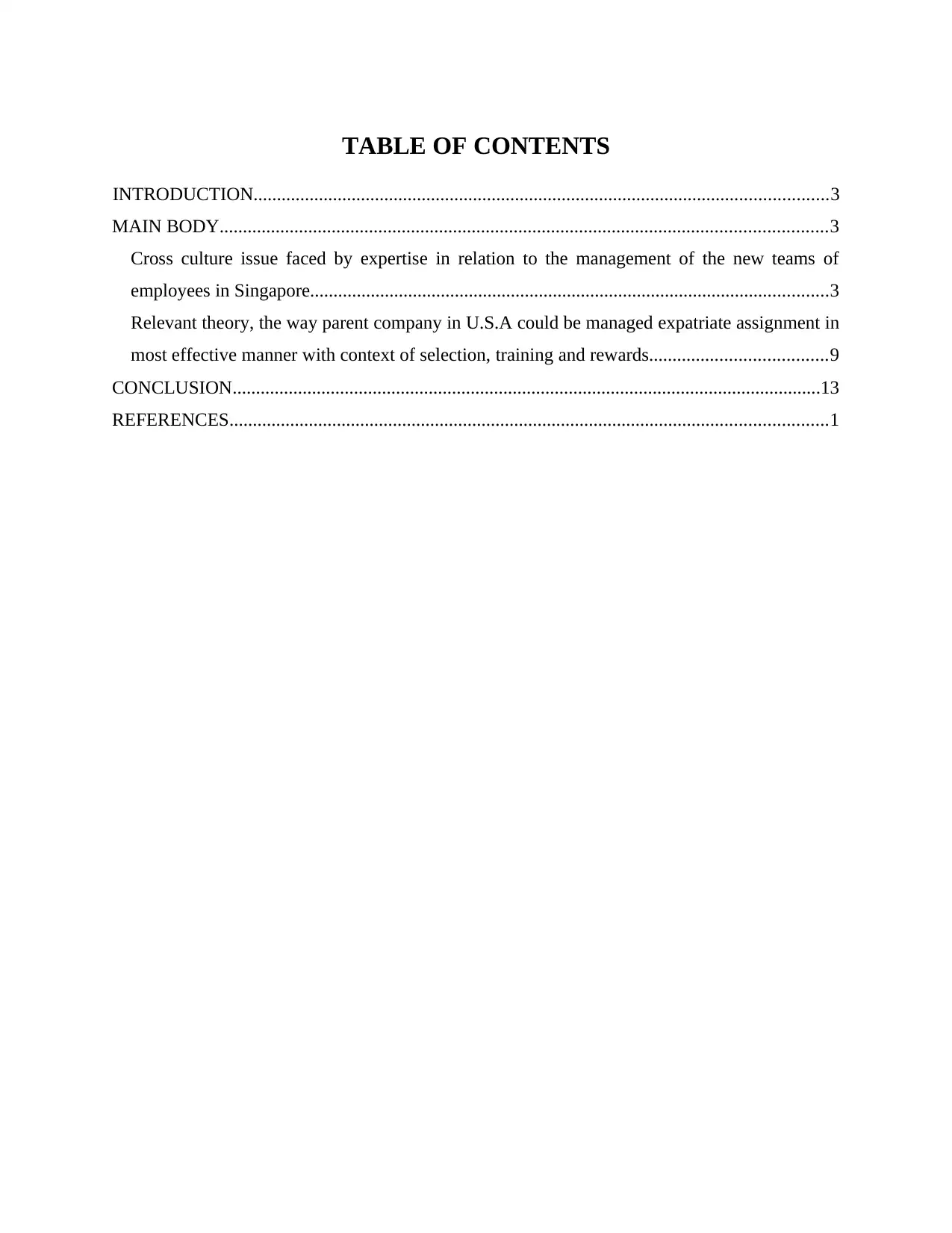
TABLE OF CONTENTS
INTRODUCTION...........................................................................................................................3
MAIN BODY..................................................................................................................................3
Cross culture issue faced by expertise in relation to the management of the new teams of
employees in Singapore...............................................................................................................3
Relevant theory, the way parent company in U.S.A could be managed expatriate assignment in
most effective manner with context of selection, training and rewards......................................9
CONCLUSION..............................................................................................................................13
REFERENCES................................................................................................................................1
INTRODUCTION...........................................................................................................................3
MAIN BODY..................................................................................................................................3
Cross culture issue faced by expertise in relation to the management of the new teams of
employees in Singapore...............................................................................................................3
Relevant theory, the way parent company in U.S.A could be managed expatriate assignment in
most effective manner with context of selection, training and rewards......................................9
CONCLUSION..............................................................................................................................13
REFERENCES................................................................................................................................1
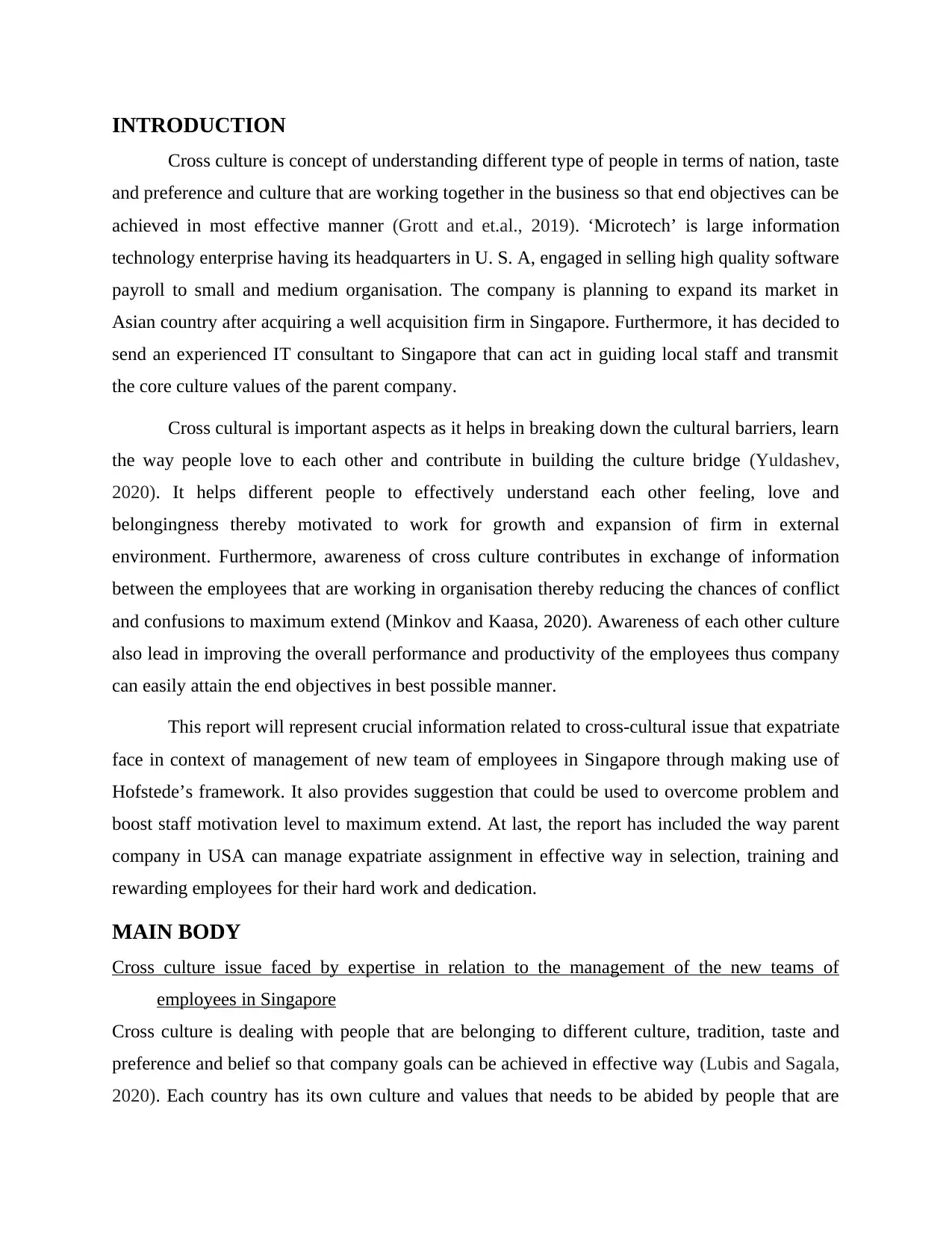
INTRODUCTION
Cross culture is concept of understanding different type of people in terms of nation, taste
and preference and culture that are working together in the business so that end objectives can be
achieved in most effective manner (Grott and et.al., 2019). ‘Microtech’ is large information
technology enterprise having its headquarters in U. S. A, engaged in selling high quality software
payroll to small and medium organisation. The company is planning to expand its market in
Asian country after acquiring a well acquisition firm in Singapore. Furthermore, it has decided to
send an experienced IT consultant to Singapore that can act in guiding local staff and transmit
the core culture values of the parent company.
Cross cultural is important aspects as it helps in breaking down the cultural barriers, learn
the way people love to each other and contribute in building the culture bridge (Yuldashev,
2020). It helps different people to effectively understand each other feeling, love and
belongingness thereby motivated to work for growth and expansion of firm in external
environment. Furthermore, awareness of cross culture contributes in exchange of information
between the employees that are working in organisation thereby reducing the chances of conflict
and confusions to maximum extend (Minkov and Kaasa, 2020). Awareness of each other culture
also lead in improving the overall performance and productivity of the employees thus company
can easily attain the end objectives in best possible manner.
This report will represent crucial information related to cross-cultural issue that expatriate
face in context of management of new team of employees in Singapore through making use of
Hofstede’s framework. It also provides suggestion that could be used to overcome problem and
boost staff motivation level to maximum extend. At last, the report has included the way parent
company in USA can manage expatriate assignment in effective way in selection, training and
rewarding employees for their hard work and dedication.
MAIN BODY
Cross culture issue faced by expertise in relation to the management of the new teams of
employees in Singapore
Cross culture is dealing with people that are belonging to different culture, tradition, taste and
preference and belief so that company goals can be achieved in effective way (Lubis and Sagala,
2020). Each country has its own culture and values that needs to be abided by people that are
Cross culture is concept of understanding different type of people in terms of nation, taste
and preference and culture that are working together in the business so that end objectives can be
achieved in most effective manner (Grott and et.al., 2019). ‘Microtech’ is large information
technology enterprise having its headquarters in U. S. A, engaged in selling high quality software
payroll to small and medium organisation. The company is planning to expand its market in
Asian country after acquiring a well acquisition firm in Singapore. Furthermore, it has decided to
send an experienced IT consultant to Singapore that can act in guiding local staff and transmit
the core culture values of the parent company.
Cross cultural is important aspects as it helps in breaking down the cultural barriers, learn
the way people love to each other and contribute in building the culture bridge (Yuldashev,
2020). It helps different people to effectively understand each other feeling, love and
belongingness thereby motivated to work for growth and expansion of firm in external
environment. Furthermore, awareness of cross culture contributes in exchange of information
between the employees that are working in organisation thereby reducing the chances of conflict
and confusions to maximum extend (Minkov and Kaasa, 2020). Awareness of each other culture
also lead in improving the overall performance and productivity of the employees thus company
can easily attain the end objectives in best possible manner.
This report will represent crucial information related to cross-cultural issue that expatriate
face in context of management of new team of employees in Singapore through making use of
Hofstede’s framework. It also provides suggestion that could be used to overcome problem and
boost staff motivation level to maximum extend. At last, the report has included the way parent
company in USA can manage expatriate assignment in effective way in selection, training and
rewarding employees for their hard work and dedication.
MAIN BODY
Cross culture issue faced by expertise in relation to the management of the new teams of
employees in Singapore
Cross culture is dealing with people that are belonging to different culture, tradition, taste and
preference and belief so that company goals can be achieved in effective way (Lubis and Sagala,
2020). Each country has its own culture and values that needs to be abided by people that are
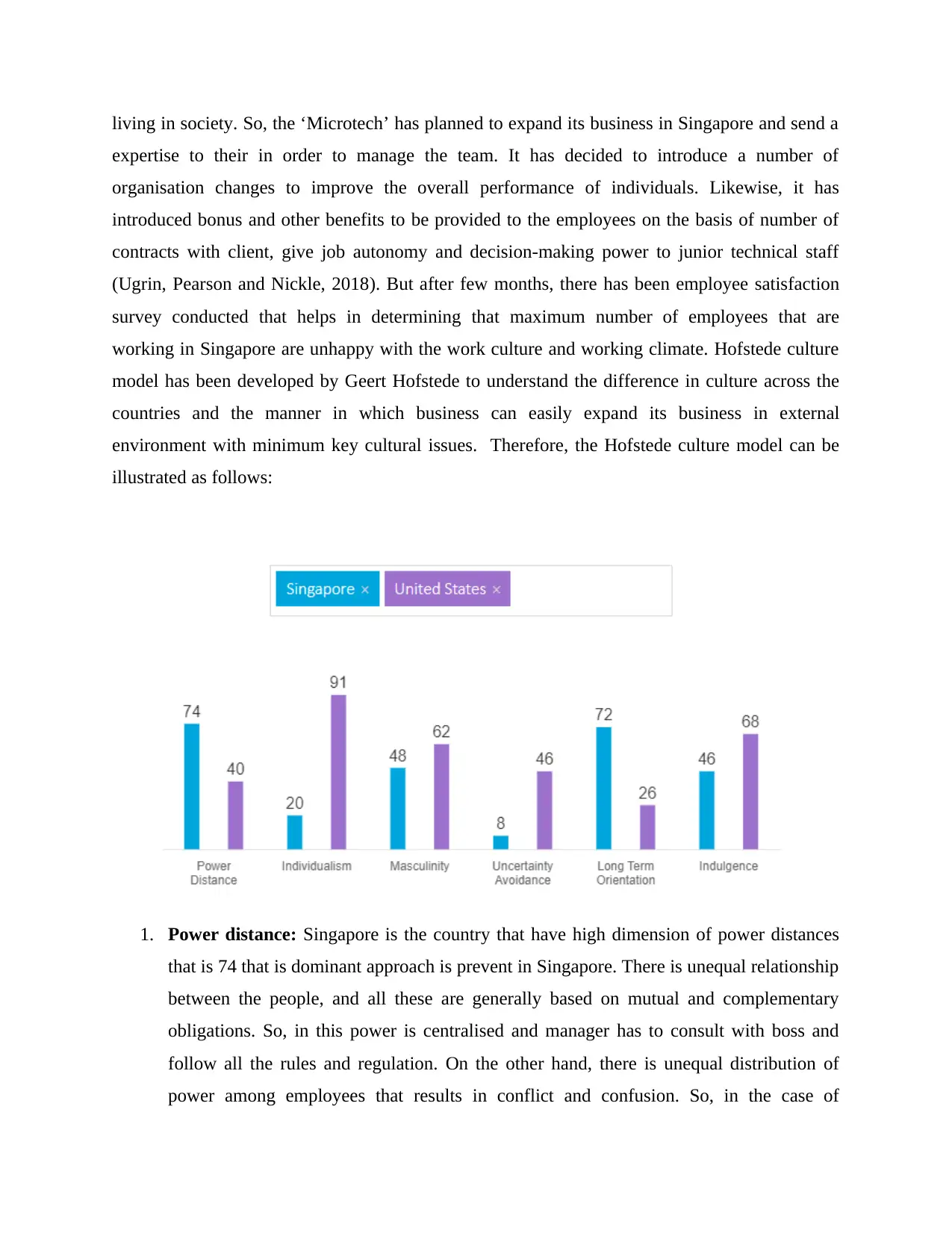
living in society. So, the ‘Microtech’ has planned to expand its business in Singapore and send a
expertise to their in order to manage the team. It has decided to introduce a number of
organisation changes to improve the overall performance of individuals. Likewise, it has
introduced bonus and other benefits to be provided to the employees on the basis of number of
contracts with client, give job autonomy and decision-making power to junior technical staff
(Ugrin, Pearson and Nickle, 2018). But after few months, there has been employee satisfaction
survey conducted that helps in determining that maximum number of employees that are
working in Singapore are unhappy with the work culture and working climate. Hofstede culture
model has been developed by Geert Hofstede to understand the difference in culture across the
countries and the manner in which business can easily expand its business in external
environment with minimum key cultural issues. Therefore, the Hofstede culture model can be
illustrated as follows:
1. Power distance: Singapore is the country that have high dimension of power distances
that is 74 that is dominant approach is prevent in Singapore. There is unequal relationship
between the people, and all these are generally based on mutual and complementary
obligations. So, in this power is centralised and manager has to consult with boss and
follow all the rules and regulation. On the other hand, there is unequal distribution of
power among employees that results in conflict and confusion. So, in the case of
expertise to their in order to manage the team. It has decided to introduce a number of
organisation changes to improve the overall performance of individuals. Likewise, it has
introduced bonus and other benefits to be provided to the employees on the basis of number of
contracts with client, give job autonomy and decision-making power to junior technical staff
(Ugrin, Pearson and Nickle, 2018). But after few months, there has been employee satisfaction
survey conducted that helps in determining that maximum number of employees that are
working in Singapore are unhappy with the work culture and working climate. Hofstede culture
model has been developed by Geert Hofstede to understand the difference in culture across the
countries and the manner in which business can easily expand its business in external
environment with minimum key cultural issues. Therefore, the Hofstede culture model can be
illustrated as follows:
1. Power distance: Singapore is the country that have high dimension of power distances
that is 74 that is dominant approach is prevent in Singapore. There is unequal relationship
between the people, and all these are generally based on mutual and complementary
obligations. So, in this power is centralised and manager has to consult with boss and
follow all the rules and regulation. On the other hand, there is unequal distribution of
power among employees that results in conflict and confusion. So, in the case of
Secure Best Marks with AI Grader
Need help grading? Try our AI Grader for instant feedback on your assignments.
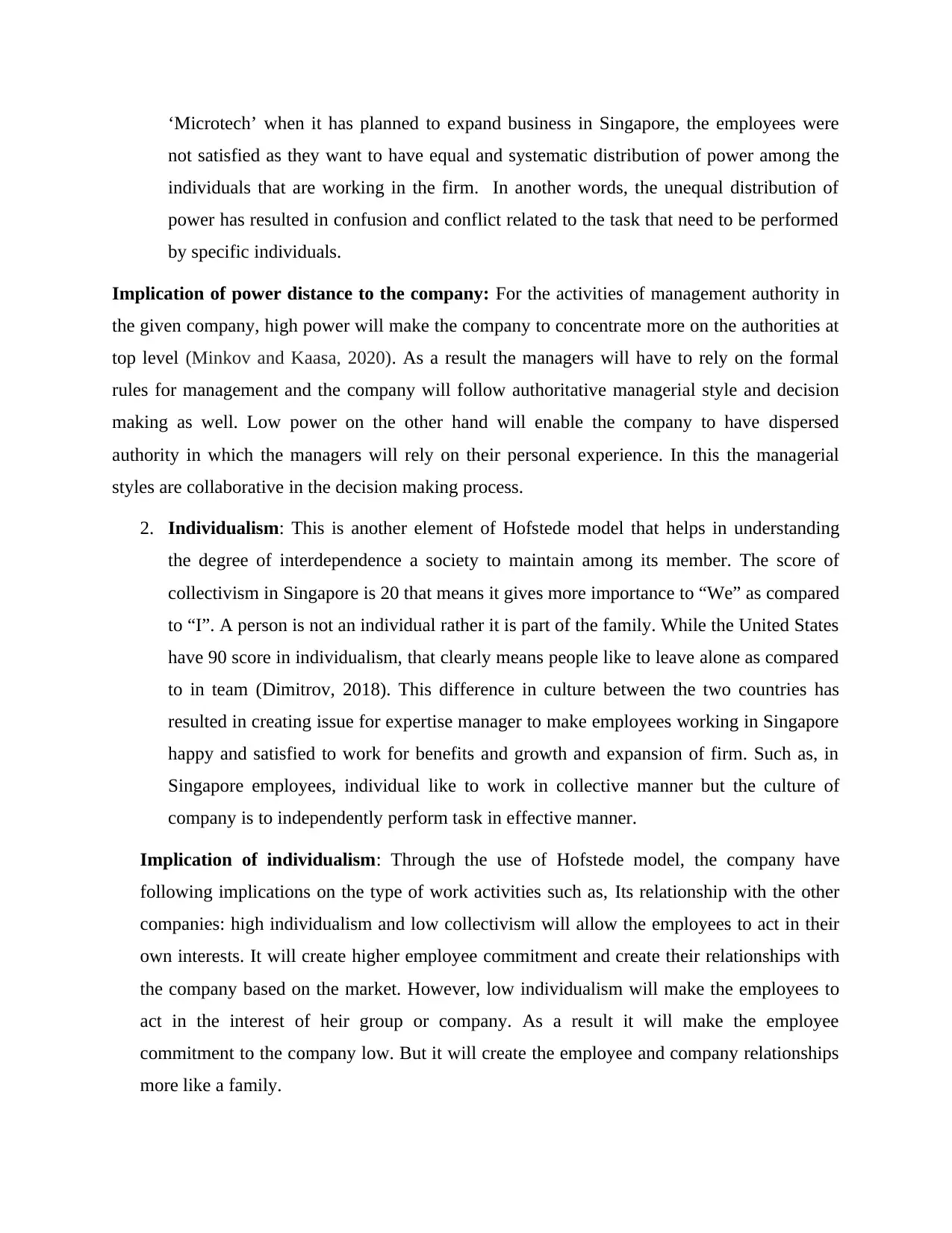
‘Microtech’ when it has planned to expand business in Singapore, the employees were
not satisfied as they want to have equal and systematic distribution of power among the
individuals that are working in the firm. In another words, the unequal distribution of
power has resulted in confusion and conflict related to the task that need to be performed
by specific individuals.
Implication of power distance to the company: For the activities of management authority in
the given company, high power will make the company to concentrate more on the authorities at
top level (Minkov and Kaasa, 2020). As a result the managers will have to rely on the formal
rules for management and the company will follow authoritative managerial style and decision
making as well. Low power on the other hand will enable the company to have dispersed
authority in which the managers will rely on their personal experience. In this the managerial
styles are collaborative in the decision making process.
2. Individualism: This is another element of Hofstede model that helps in understanding
the degree of interdependence a society to maintain among its member. The score of
collectivism in Singapore is 20 that means it gives more importance to “We” as compared
to “I”. A person is not an individual rather it is part of the family. While the United States
have 90 score in individualism, that clearly means people like to leave alone as compared
to in team (Dimitrov, 2018). This difference in culture between the two countries has
resulted in creating issue for expertise manager to make employees working in Singapore
happy and satisfied to work for benefits and growth and expansion of firm. Such as, in
Singapore employees, individual like to work in collective manner but the culture of
company is to independently perform task in effective manner.
Implication of individualism: Through the use of Hofstede model, the company have
following implications on the type of work activities such as, Its relationship with the other
companies: high individualism and low collectivism will allow the employees to act in their
own interests. It will create higher employee commitment and create their relationships with
the company based on the market. However, low individualism will make the employees to
act in the interest of heir group or company. As a result it will make the employee
commitment to the company low. But it will create the employee and company relationships
more like a family.
not satisfied as they want to have equal and systematic distribution of power among the
individuals that are working in the firm. In another words, the unequal distribution of
power has resulted in confusion and conflict related to the task that need to be performed
by specific individuals.
Implication of power distance to the company: For the activities of management authority in
the given company, high power will make the company to concentrate more on the authorities at
top level (Minkov and Kaasa, 2020). As a result the managers will have to rely on the formal
rules for management and the company will follow authoritative managerial style and decision
making as well. Low power on the other hand will enable the company to have dispersed
authority in which the managers will rely on their personal experience. In this the managerial
styles are collaborative in the decision making process.
2. Individualism: This is another element of Hofstede model that helps in understanding
the degree of interdependence a society to maintain among its member. The score of
collectivism in Singapore is 20 that means it gives more importance to “We” as compared
to “I”. A person is not an individual rather it is part of the family. While the United States
have 90 score in individualism, that clearly means people like to leave alone as compared
to in team (Dimitrov, 2018). This difference in culture between the two countries has
resulted in creating issue for expertise manager to make employees working in Singapore
happy and satisfied to work for benefits and growth and expansion of firm. Such as, in
Singapore employees, individual like to work in collective manner but the culture of
company is to independently perform task in effective manner.
Implication of individualism: Through the use of Hofstede model, the company have
following implications on the type of work activities such as, Its relationship with the other
companies: high individualism and low collectivism will allow the employees to act in their
own interests. It will create higher employee commitment and create their relationships with
the company based on the market. However, low individualism will make the employees to
act in the interest of heir group or company. As a result it will make the employee
commitment to the company low. But it will create the employee and company relationships
more like a family.
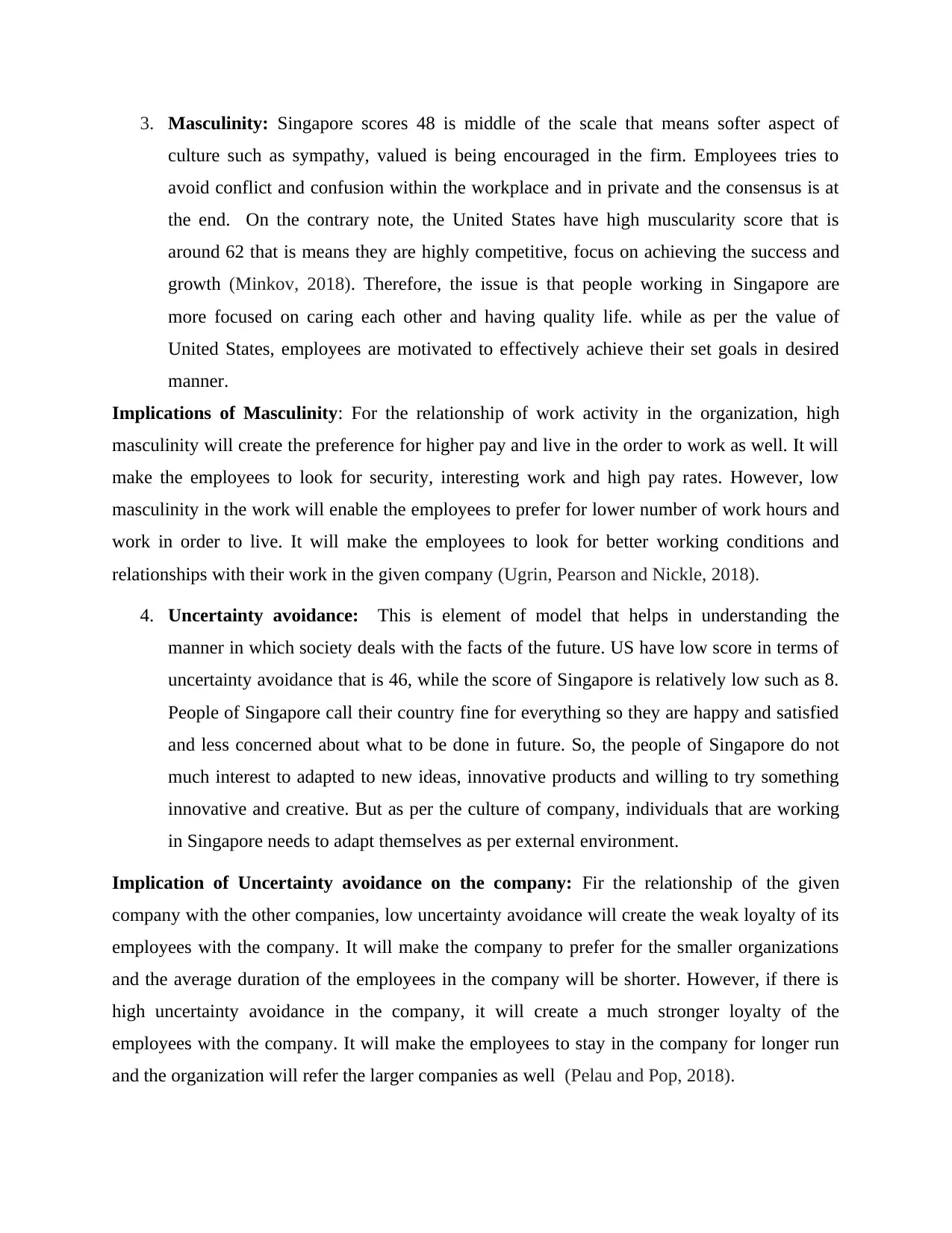
3. Masculinity: Singapore scores 48 is middle of the scale that means softer aspect of
culture such as sympathy, valued is being encouraged in the firm. Employees tries to
avoid conflict and confusion within the workplace and in private and the consensus is at
the end. On the contrary note, the United States have high muscularity score that is
around 62 that is means they are highly competitive, focus on achieving the success and
growth (Minkov, 2018). Therefore, the issue is that people working in Singapore are
more focused on caring each other and having quality life. while as per the value of
United States, employees are motivated to effectively achieve their set goals in desired
manner.
Implications of Masculinity: For the relationship of work activity in the organization, high
masculinity will create the preference for higher pay and live in the order to work as well. It will
make the employees to look for security, interesting work and high pay rates. However, low
masculinity in the work will enable the employees to prefer for lower number of work hours and
work in order to live. It will make the employees to look for better working conditions and
relationships with their work in the given company (Ugrin, Pearson and Nickle, 2018).
4. Uncertainty avoidance: This is element of model that helps in understanding the
manner in which society deals with the facts of the future. US have low score in terms of
uncertainty avoidance that is 46, while the score of Singapore is relatively low such as 8.
People of Singapore call their country fine for everything so they are happy and satisfied
and less concerned about what to be done in future. So, the people of Singapore do not
much interest to adapted to new ideas, innovative products and willing to try something
innovative and creative. But as per the culture of company, individuals that are working
in Singapore needs to adapt themselves as per external environment.
Implication of Uncertainty avoidance on the company: Fir the relationship of the given
company with the other companies, low uncertainty avoidance will create the weak loyalty of its
employees with the company. It will make the company to prefer for the smaller organizations
and the average duration of the employees in the company will be shorter. However, if there is
high uncertainty avoidance in the company, it will create a much stronger loyalty of the
employees with the company. It will make the employees to stay in the company for longer run
and the organization will refer the larger companies as well (Pelau and Pop, 2018).
culture such as sympathy, valued is being encouraged in the firm. Employees tries to
avoid conflict and confusion within the workplace and in private and the consensus is at
the end. On the contrary note, the United States have high muscularity score that is
around 62 that is means they are highly competitive, focus on achieving the success and
growth (Minkov, 2018). Therefore, the issue is that people working in Singapore are
more focused on caring each other and having quality life. while as per the value of
United States, employees are motivated to effectively achieve their set goals in desired
manner.
Implications of Masculinity: For the relationship of work activity in the organization, high
masculinity will create the preference for higher pay and live in the order to work as well. It will
make the employees to look for security, interesting work and high pay rates. However, low
masculinity in the work will enable the employees to prefer for lower number of work hours and
work in order to live. It will make the employees to look for better working conditions and
relationships with their work in the given company (Ugrin, Pearson and Nickle, 2018).
4. Uncertainty avoidance: This is element of model that helps in understanding the
manner in which society deals with the facts of the future. US have low score in terms of
uncertainty avoidance that is 46, while the score of Singapore is relatively low such as 8.
People of Singapore call their country fine for everything so they are happy and satisfied
and less concerned about what to be done in future. So, the people of Singapore do not
much interest to adapted to new ideas, innovative products and willing to try something
innovative and creative. But as per the culture of company, individuals that are working
in Singapore needs to adapt themselves as per external environment.
Implication of Uncertainty avoidance on the company: Fir the relationship of the given
company with the other companies, low uncertainty avoidance will create the weak loyalty of its
employees with the company. It will make the company to prefer for the smaller organizations
and the average duration of the employees in the company will be shorter. However, if there is
high uncertainty avoidance in the company, it will create a much stronger loyalty of the
employees with the company. It will make the employees to stay in the company for longer run
and the organization will refer the larger companies as well (Pelau and Pop, 2018).
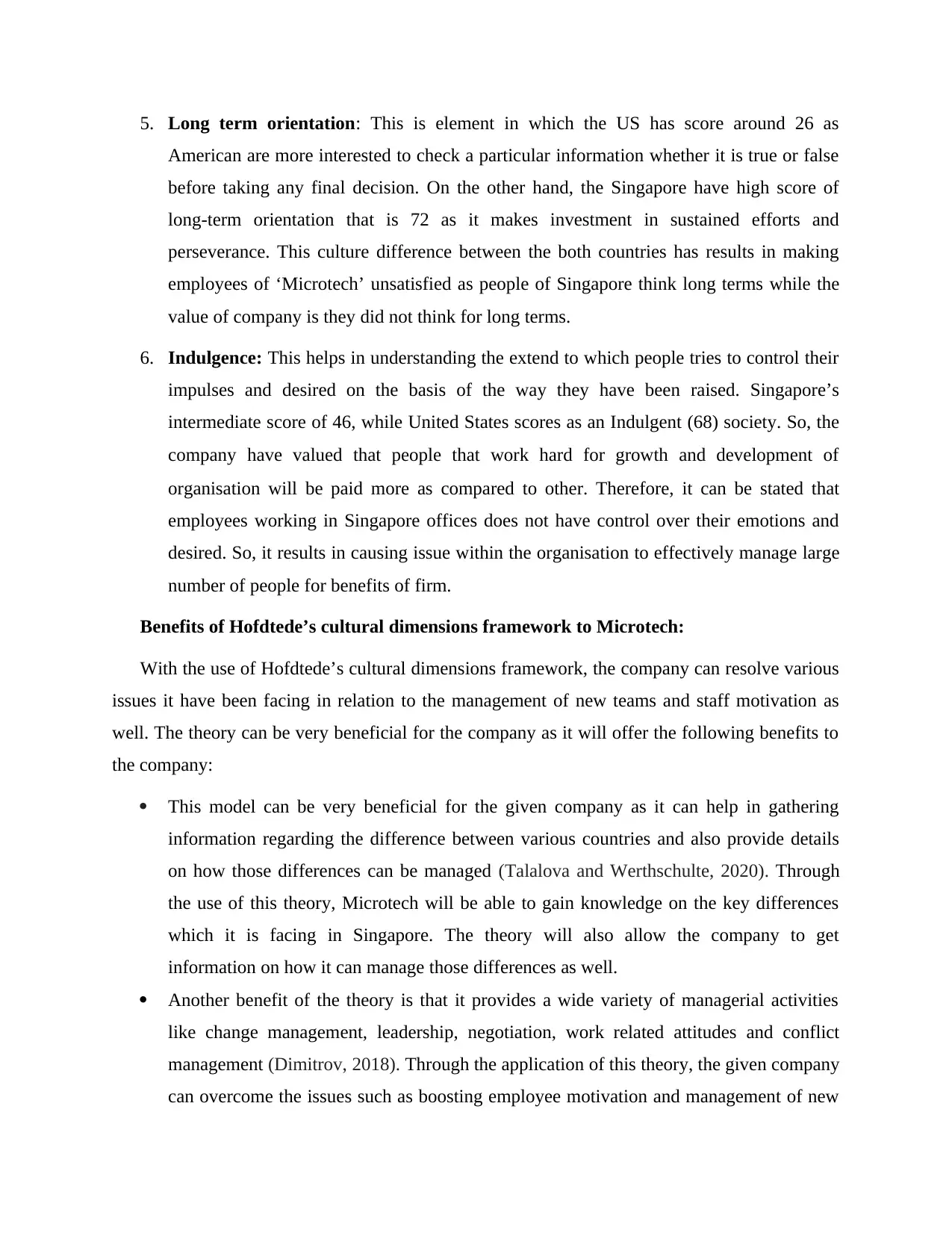
5. Long term orientation: This is element in which the US has score around 26 as
American are more interested to check a particular information whether it is true or false
before taking any final decision. On the other hand, the Singapore have high score of
long-term orientation that is 72 as it makes investment in sustained efforts and
perseverance. This culture difference between the both countries has results in making
employees of ‘Microtech’ unsatisfied as people of Singapore think long terms while the
value of company is they did not think for long terms.
6. Indulgence: This helps in understanding the extend to which people tries to control their
impulses and desired on the basis of the way they have been raised. Singapore’s
intermediate score of 46, while United States scores as an Indulgent (68) society. So, the
company have valued that people that work hard for growth and development of
organisation will be paid more as compared to other. Therefore, it can be stated that
employees working in Singapore offices does not have control over their emotions and
desired. So, it results in causing issue within the organisation to effectively manage large
number of people for benefits of firm.
Benefits of Hofdtede’s cultural dimensions framework to Microtech:
With the use of Hofdtede’s cultural dimensions framework, the company can resolve various
issues it have been facing in relation to the management of new teams and staff motivation as
well. The theory can be very beneficial for the company as it will offer the following benefits to
the company:
This model can be very beneficial for the given company as it can help in gathering
information regarding the difference between various countries and also provide details
on how those differences can be managed (Talalova and Werthschulte, 2020). Through
the use of this theory, Microtech will be able to gain knowledge on the key differences
which it is facing in Singapore. The theory will also allow the company to get
information on how it can manage those differences as well.
Another benefit of the theory is that it provides a wide variety of managerial activities
like change management, leadership, negotiation, work related attitudes and conflict
management (Dimitrov, 2018). Through the application of this theory, the given company
can overcome the issues such as boosting employee motivation and management of new
American are more interested to check a particular information whether it is true or false
before taking any final decision. On the other hand, the Singapore have high score of
long-term orientation that is 72 as it makes investment in sustained efforts and
perseverance. This culture difference between the both countries has results in making
employees of ‘Microtech’ unsatisfied as people of Singapore think long terms while the
value of company is they did not think for long terms.
6. Indulgence: This helps in understanding the extend to which people tries to control their
impulses and desired on the basis of the way they have been raised. Singapore’s
intermediate score of 46, while United States scores as an Indulgent (68) society. So, the
company have valued that people that work hard for growth and development of
organisation will be paid more as compared to other. Therefore, it can be stated that
employees working in Singapore offices does not have control over their emotions and
desired. So, it results in causing issue within the organisation to effectively manage large
number of people for benefits of firm.
Benefits of Hofdtede’s cultural dimensions framework to Microtech:
With the use of Hofdtede’s cultural dimensions framework, the company can resolve various
issues it have been facing in relation to the management of new teams and staff motivation as
well. The theory can be very beneficial for the company as it will offer the following benefits to
the company:
This model can be very beneficial for the given company as it can help in gathering
information regarding the difference between various countries and also provide details
on how those differences can be managed (Talalova and Werthschulte, 2020). Through
the use of this theory, Microtech will be able to gain knowledge on the key differences
which it is facing in Singapore. The theory will also allow the company to get
information on how it can manage those differences as well.
Another benefit of the theory is that it provides a wide variety of managerial activities
like change management, leadership, negotiation, work related attitudes and conflict
management (Dimitrov, 2018). Through the application of this theory, the given company
can overcome the issues such as boosting employee motivation and management of new
Paraphrase This Document
Need a fresh take? Get an instant paraphrase of this document with our AI Paraphraser
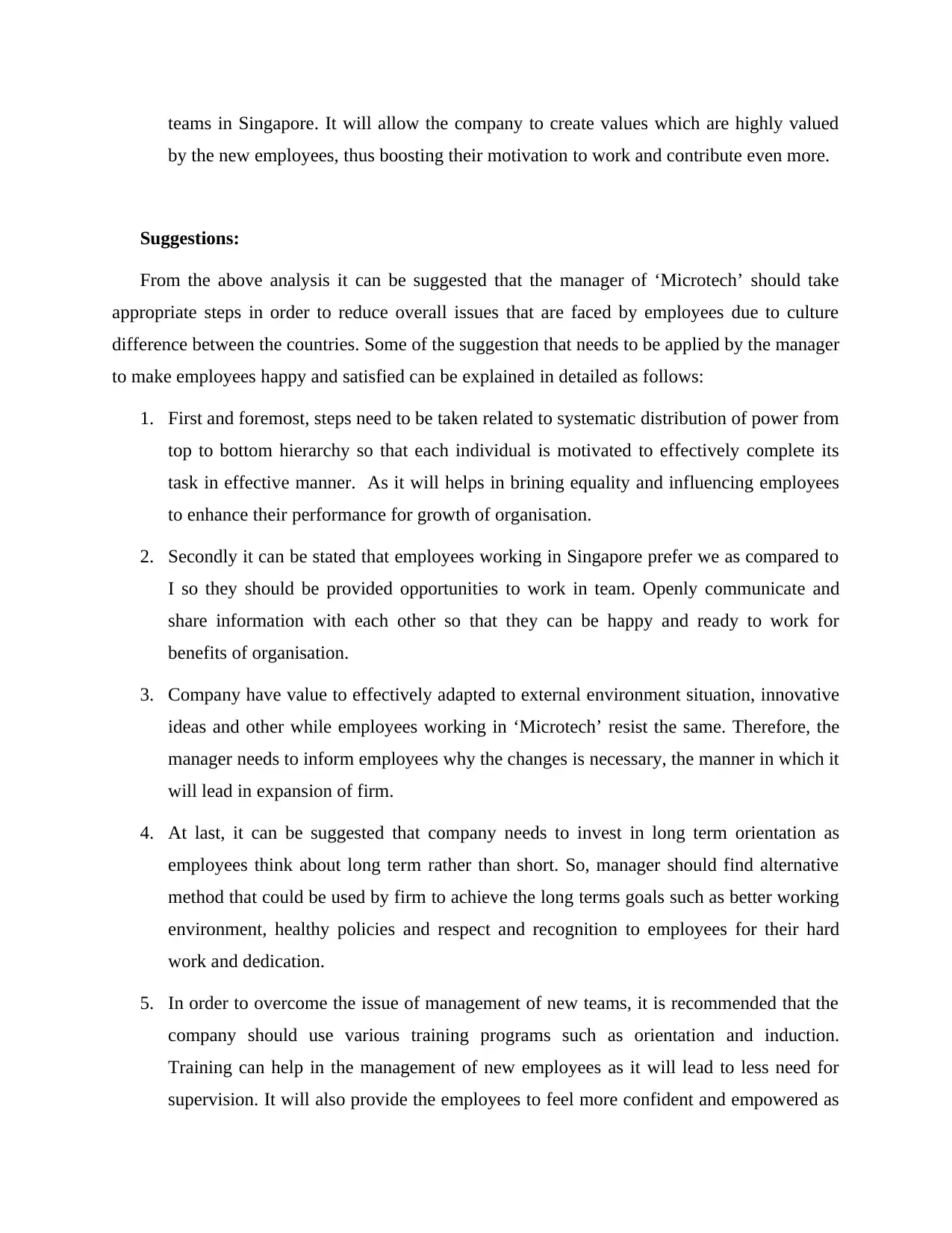
teams in Singapore. It will allow the company to create values which are highly valued
by the new employees, thus boosting their motivation to work and contribute even more.
Suggestions:
From the above analysis it can be suggested that the manager of ‘Microtech’ should take
appropriate steps in order to reduce overall issues that are faced by employees due to culture
difference between the countries. Some of the suggestion that needs to be applied by the manager
to make employees happy and satisfied can be explained in detailed as follows:
1. First and foremost, steps need to be taken related to systematic distribution of power from
top to bottom hierarchy so that each individual is motivated to effectively complete its
task in effective manner. As it will helps in brining equality and influencing employees
to enhance their performance for growth of organisation.
2. Secondly it can be stated that employees working in Singapore prefer we as compared to
I so they should be provided opportunities to work in team. Openly communicate and
share information with each other so that they can be happy and ready to work for
benefits of organisation.
3. Company have value to effectively adapted to external environment situation, innovative
ideas and other while employees working in ‘Microtech’ resist the same. Therefore, the
manager needs to inform employees why the changes is necessary, the manner in which it
will lead in expansion of firm.
4. At last, it can be suggested that company needs to invest in long term orientation as
employees think about long term rather than short. So, manager should find alternative
method that could be used by firm to achieve the long terms goals such as better working
environment, healthy policies and respect and recognition to employees for their hard
work and dedication.
5. In order to overcome the issue of management of new teams, it is recommended that the
company should use various training programs such as orientation and induction.
Training can help in the management of new employees as it will lead to less need for
supervision. It will also provide the employees to feel more confident and empowered as
by the new employees, thus boosting their motivation to work and contribute even more.
Suggestions:
From the above analysis it can be suggested that the manager of ‘Microtech’ should take
appropriate steps in order to reduce overall issues that are faced by employees due to culture
difference between the countries. Some of the suggestion that needs to be applied by the manager
to make employees happy and satisfied can be explained in detailed as follows:
1. First and foremost, steps need to be taken related to systematic distribution of power from
top to bottom hierarchy so that each individual is motivated to effectively complete its
task in effective manner. As it will helps in brining equality and influencing employees
to enhance their performance for growth of organisation.
2. Secondly it can be stated that employees working in Singapore prefer we as compared to
I so they should be provided opportunities to work in team. Openly communicate and
share information with each other so that they can be happy and ready to work for
benefits of organisation.
3. Company have value to effectively adapted to external environment situation, innovative
ideas and other while employees working in ‘Microtech’ resist the same. Therefore, the
manager needs to inform employees why the changes is necessary, the manner in which it
will lead in expansion of firm.
4. At last, it can be suggested that company needs to invest in long term orientation as
employees think about long term rather than short. So, manager should find alternative
method that could be used by firm to achieve the long terms goals such as better working
environment, healthy policies and respect and recognition to employees for their hard
work and dedication.
5. In order to overcome the issue of management of new teams, it is recommended that the
company should use various training programs such as orientation and induction.
Training can help in the management of new employees as it will lead to less need for
supervision. It will also provide the employees to feel more confident and empowered as
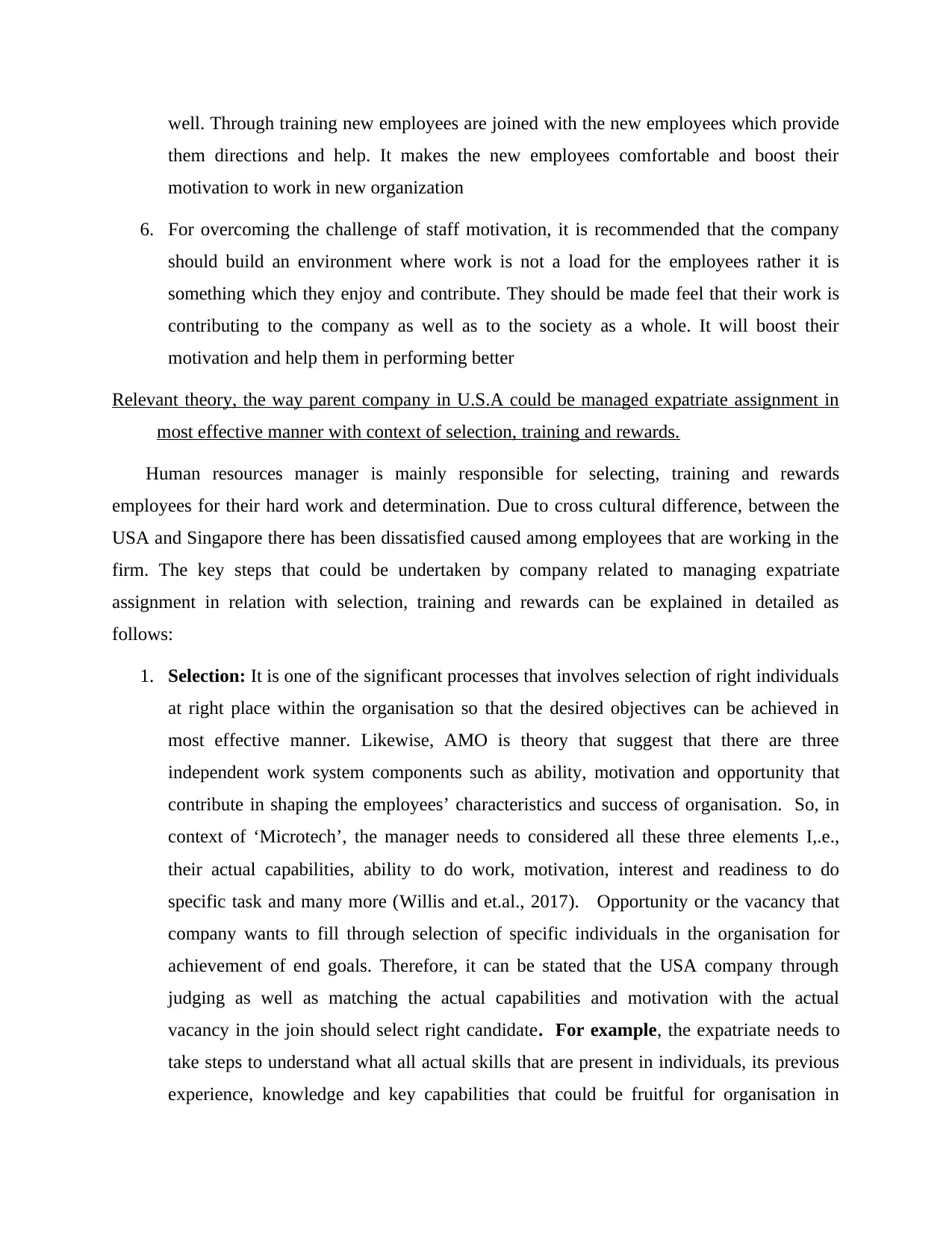
well. Through training new employees are joined with the new employees which provide
them directions and help. It makes the new employees comfortable and boost their
motivation to work in new organization
6. For overcoming the challenge of staff motivation, it is recommended that the company
should build an environment where work is not a load for the employees rather it is
something which they enjoy and contribute. They should be made feel that their work is
contributing to the company as well as to the society as a whole. It will boost their
motivation and help them in performing better
Relevant theory, the way parent company in U.S.A could be managed expatriate assignment in
most effective manner with context of selection, training and rewards.
Human resources manager is mainly responsible for selecting, training and rewards
employees for their hard work and determination. Due to cross cultural difference, between the
USA and Singapore there has been dissatisfied caused among employees that are working in the
firm. The key steps that could be undertaken by company related to managing expatriate
assignment in relation with selection, training and rewards can be explained in detailed as
follows:
1. Selection: It is one of the significant processes that involves selection of right individuals
at right place within the organisation so that the desired objectives can be achieved in
most effective manner. Likewise, AMO is theory that suggest that there are three
independent work system components such as ability, motivation and opportunity that
contribute in shaping the employees’ characteristics and success of organisation. So, in
context of ‘Microtech’, the manager needs to considered all these three elements I,.e.,
their actual capabilities, ability to do work, motivation, interest and readiness to do
specific task and many more (Willis and et.al., 2017). Opportunity or the vacancy that
company wants to fill through selection of specific individuals in the organisation for
achievement of end goals. Therefore, it can be stated that the USA company through
judging as well as matching the actual capabilities and motivation with the actual
vacancy in the join should select right candidate. For example, the expatriate needs to
take steps to understand what all actual skills that are present in individuals, its previous
experience, knowledge and key capabilities that could be fruitful for organisation in
them directions and help. It makes the new employees comfortable and boost their
motivation to work in new organization
6. For overcoming the challenge of staff motivation, it is recommended that the company
should build an environment where work is not a load for the employees rather it is
something which they enjoy and contribute. They should be made feel that their work is
contributing to the company as well as to the society as a whole. It will boost their
motivation and help them in performing better
Relevant theory, the way parent company in U.S.A could be managed expatriate assignment in
most effective manner with context of selection, training and rewards.
Human resources manager is mainly responsible for selecting, training and rewards
employees for their hard work and determination. Due to cross cultural difference, between the
USA and Singapore there has been dissatisfied caused among employees that are working in the
firm. The key steps that could be undertaken by company related to managing expatriate
assignment in relation with selection, training and rewards can be explained in detailed as
follows:
1. Selection: It is one of the significant processes that involves selection of right individuals
at right place within the organisation so that the desired objectives can be achieved in
most effective manner. Likewise, AMO is theory that suggest that there are three
independent work system components such as ability, motivation and opportunity that
contribute in shaping the employees’ characteristics and success of organisation. So, in
context of ‘Microtech’, the manager needs to considered all these three elements I,.e.,
their actual capabilities, ability to do work, motivation, interest and readiness to do
specific task and many more (Willis and et.al., 2017). Opportunity or the vacancy that
company wants to fill through selection of specific individuals in the organisation for
achievement of end goals. Therefore, it can be stated that the USA company through
judging as well as matching the actual capabilities and motivation with the actual
vacancy in the join should select right candidate. For example, the expatriate needs to
take steps to understand what all actual skills that are present in individuals, its previous
experience, knowledge and key capabilities that could be fruitful for organisation in
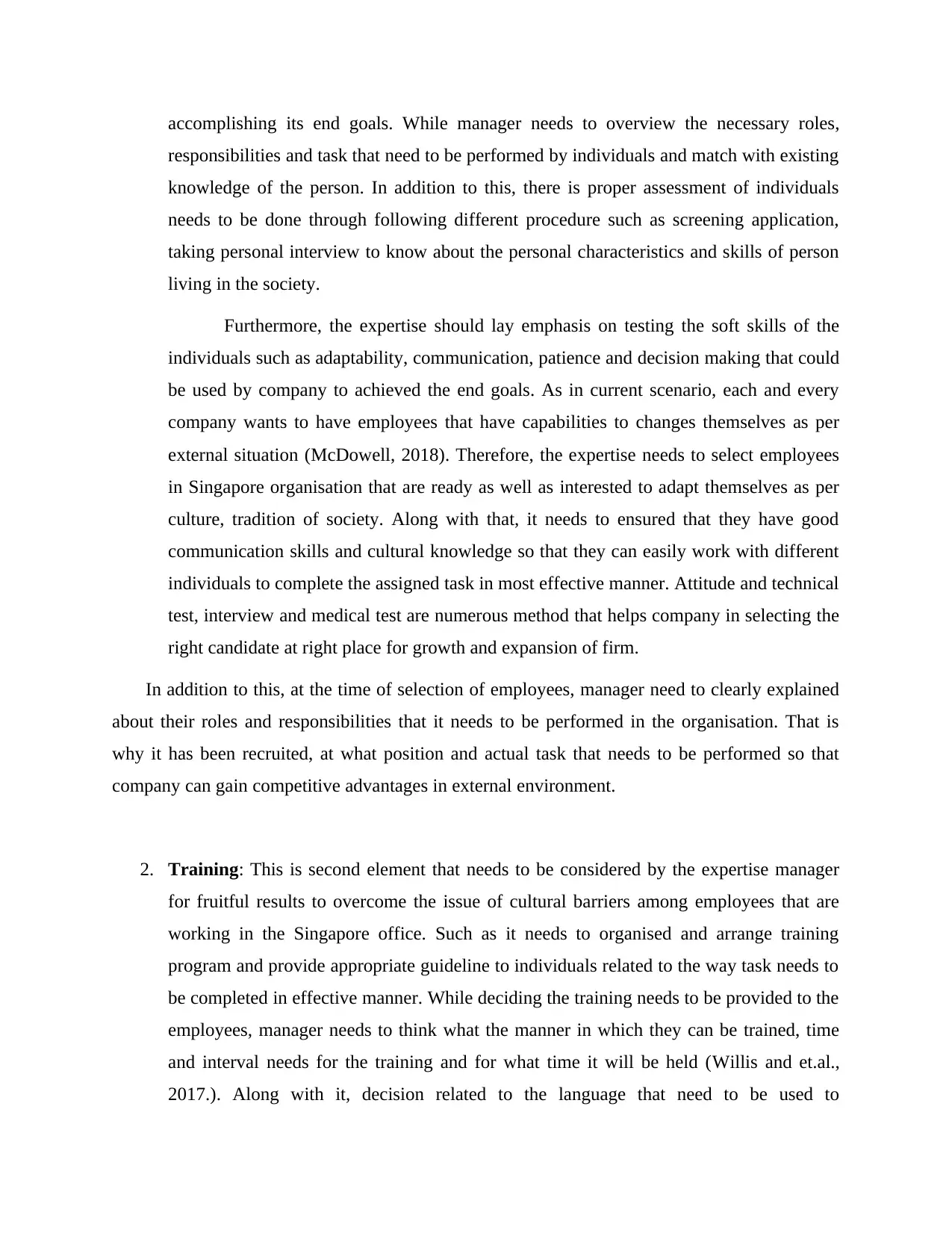
accomplishing its end goals. While manager needs to overview the necessary roles,
responsibilities and task that need to be performed by individuals and match with existing
knowledge of the person. In addition to this, there is proper assessment of individuals
needs to be done through following different procedure such as screening application,
taking personal interview to know about the personal characteristics and skills of person
living in the society.
Furthermore, the expertise should lay emphasis on testing the soft skills of the
individuals such as adaptability, communication, patience and decision making that could
be used by company to achieved the end goals. As in current scenario, each and every
company wants to have employees that have capabilities to changes themselves as per
external situation (McDowell, 2018). Therefore, the expertise needs to select employees
in Singapore organisation that are ready as well as interested to adapt themselves as per
culture, tradition of society. Along with that, it needs to ensured that they have good
communication skills and cultural knowledge so that they can easily work with different
individuals to complete the assigned task in most effective manner. Attitude and technical
test, interview and medical test are numerous method that helps company in selecting the
right candidate at right place for growth and expansion of firm.
In addition to this, at the time of selection of employees, manager need to clearly explained
about their roles and responsibilities that it needs to be performed in the organisation. That is
why it has been recruited, at what position and actual task that needs to be performed so that
company can gain competitive advantages in external environment.
2. Training: This is second element that needs to be considered by the expertise manager
for fruitful results to overcome the issue of cultural barriers among employees that are
working in the Singapore office. Such as it needs to organised and arrange training
program and provide appropriate guideline to individuals related to the way task needs to
be completed in effective manner. While deciding the training needs to be provided to the
employees, manager needs to think what the manner in which they can be trained, time
and interval needs for the training and for what time it will be held (Willis and et.al.,
2017.). Along with it, decision related to the language that need to be used to
responsibilities and task that need to be performed by individuals and match with existing
knowledge of the person. In addition to this, there is proper assessment of individuals
needs to be done through following different procedure such as screening application,
taking personal interview to know about the personal characteristics and skills of person
living in the society.
Furthermore, the expertise should lay emphasis on testing the soft skills of the
individuals such as adaptability, communication, patience and decision making that could
be used by company to achieved the end goals. As in current scenario, each and every
company wants to have employees that have capabilities to changes themselves as per
external situation (McDowell, 2018). Therefore, the expertise needs to select employees
in Singapore organisation that are ready as well as interested to adapt themselves as per
culture, tradition of society. Along with that, it needs to ensured that they have good
communication skills and cultural knowledge so that they can easily work with different
individuals to complete the assigned task in most effective manner. Attitude and technical
test, interview and medical test are numerous method that helps company in selecting the
right candidate at right place for growth and expansion of firm.
In addition to this, at the time of selection of employees, manager need to clearly explained
about their roles and responsibilities that it needs to be performed in the organisation. That is
why it has been recruited, at what position and actual task that needs to be performed so that
company can gain competitive advantages in external environment.
2. Training: This is second element that needs to be considered by the expertise manager
for fruitful results to overcome the issue of cultural barriers among employees that are
working in the Singapore office. Such as it needs to organised and arrange training
program and provide appropriate guideline to individuals related to the way task needs to
be completed in effective manner. While deciding the training needs to be provided to the
employees, manager needs to think what the manner in which they can be trained, time
and interval needs for the training and for what time it will be held (Willis and et.al.,
2017.). Along with it, decision related to the language that need to be used to
Secure Best Marks with AI Grader
Need help grading? Try our AI Grader for instant feedback on your assignments.
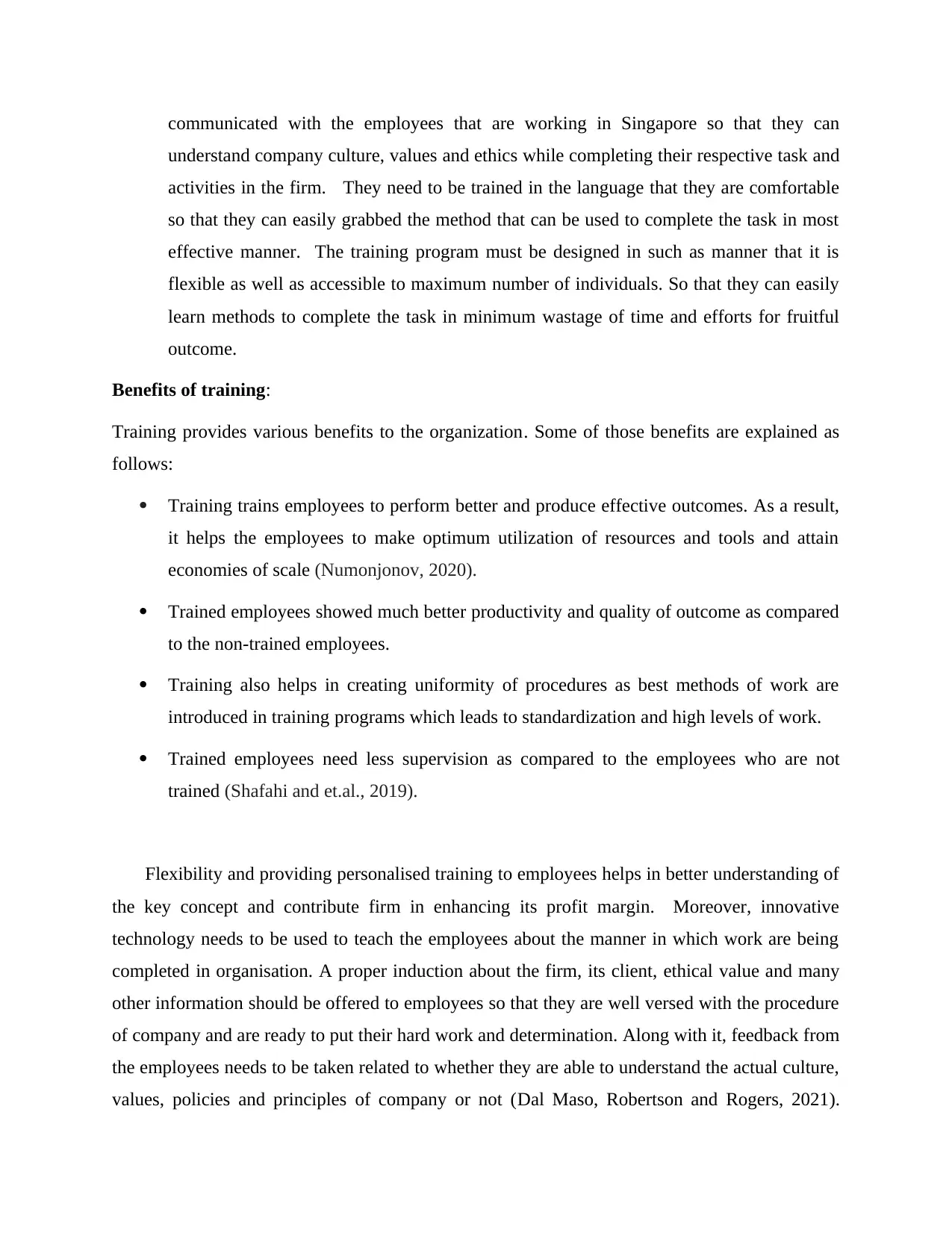
communicated with the employees that are working in Singapore so that they can
understand company culture, values and ethics while completing their respective task and
activities in the firm. They need to be trained in the language that they are comfortable
so that they can easily grabbed the method that can be used to complete the task in most
effective manner. The training program must be designed in such as manner that it is
flexible as well as accessible to maximum number of individuals. So that they can easily
learn methods to complete the task in minimum wastage of time and efforts for fruitful
outcome.
Benefits of training:
Training provides various benefits to the organization. Some of those benefits are explained as
follows:
Training trains employees to perform better and produce effective outcomes. As a result,
it helps the employees to make optimum utilization of resources and tools and attain
economies of scale (Numonjonov, 2020).
Trained employees showed much better productivity and quality of outcome as compared
to the non-trained employees.
Training also helps in creating uniformity of procedures as best methods of work are
introduced in training programs which leads to standardization and high levels of work.
Trained employees need less supervision as compared to the employees who are not
trained (Shafahi and et.al., 2019).
Flexibility and providing personalised training to employees helps in better understanding of
the key concept and contribute firm in enhancing its profit margin. Moreover, innovative
technology needs to be used to teach the employees about the manner in which work are being
completed in organisation. A proper induction about the firm, its client, ethical value and many
other information should be offered to employees so that they are well versed with the procedure
of company and are ready to put their hard work and determination. Along with it, feedback from
the employees needs to be taken related to whether they are able to understand the actual culture,
values, policies and principles of company or not (Dal Maso, Robertson and Rogers, 2021).
understand company culture, values and ethics while completing their respective task and
activities in the firm. They need to be trained in the language that they are comfortable
so that they can easily grabbed the method that can be used to complete the task in most
effective manner. The training program must be designed in such as manner that it is
flexible as well as accessible to maximum number of individuals. So that they can easily
learn methods to complete the task in minimum wastage of time and efforts for fruitful
outcome.
Benefits of training:
Training provides various benefits to the organization. Some of those benefits are explained as
follows:
Training trains employees to perform better and produce effective outcomes. As a result,
it helps the employees to make optimum utilization of resources and tools and attain
economies of scale (Numonjonov, 2020).
Trained employees showed much better productivity and quality of outcome as compared
to the non-trained employees.
Training also helps in creating uniformity of procedures as best methods of work are
introduced in training programs which leads to standardization and high levels of work.
Trained employees need less supervision as compared to the employees who are not
trained (Shafahi and et.al., 2019).
Flexibility and providing personalised training to employees helps in better understanding of
the key concept and contribute firm in enhancing its profit margin. Moreover, innovative
technology needs to be used to teach the employees about the manner in which work are being
completed in organisation. A proper induction about the firm, its client, ethical value and many
other information should be offered to employees so that they are well versed with the procedure
of company and are ready to put their hard work and determination. Along with it, feedback from
the employees needs to be taken related to whether they are able to understand the actual culture,
values, policies and principles of company or not (Dal Maso, Robertson and Rogers, 2021).
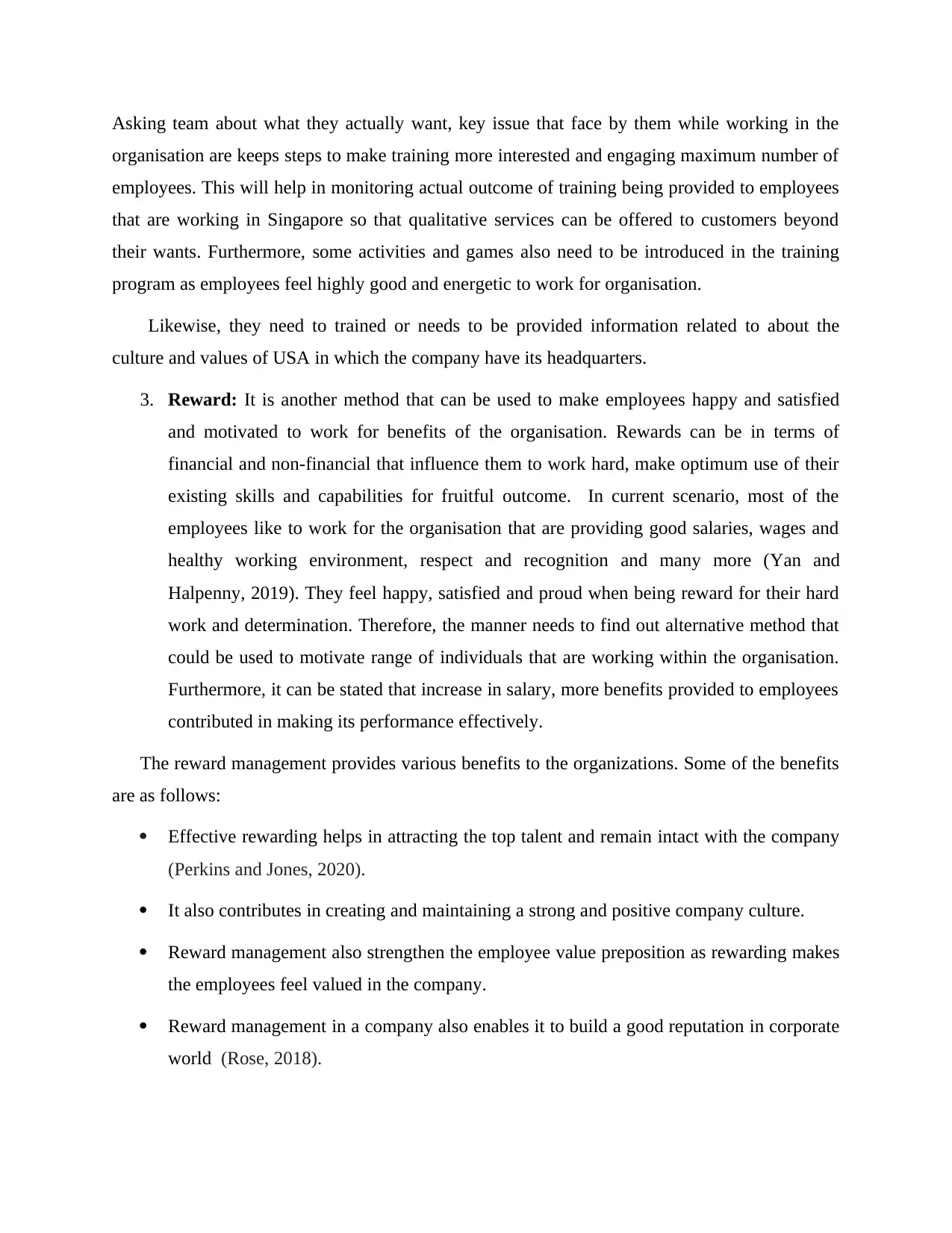
Asking team about what they actually want, key issue that face by them while working in the
organisation are keeps steps to make training more interested and engaging maximum number of
employees. This will help in monitoring actual outcome of training being provided to employees
that are working in Singapore so that qualitative services can be offered to customers beyond
their wants. Furthermore, some activities and games also need to be introduced in the training
program as employees feel highly good and energetic to work for organisation.
Likewise, they need to trained or needs to be provided information related to about the
culture and values of USA in which the company have its headquarters.
3. Reward: It is another method that can be used to make employees happy and satisfied
and motivated to work for benefits of the organisation. Rewards can be in terms of
financial and non-financial that influence them to work hard, make optimum use of their
existing skills and capabilities for fruitful outcome. In current scenario, most of the
employees like to work for the organisation that are providing good salaries, wages and
healthy working environment, respect and recognition and many more (Yan and
Halpenny, 2019). They feel happy, satisfied and proud when being reward for their hard
work and determination. Therefore, the manner needs to find out alternative method that
could be used to motivate range of individuals that are working within the organisation.
Furthermore, it can be stated that increase in salary, more benefits provided to employees
contributed in making its performance effectively.
The reward management provides various benefits to the organizations. Some of the benefits
are as follows:
Effective rewarding helps in attracting the top talent and remain intact with the company
(Perkins and Jones, 2020).
It also contributes in creating and maintaining a strong and positive company culture.
Reward management also strengthen the employee value preposition as rewarding makes
the employees feel valued in the company.
Reward management in a company also enables it to build a good reputation in corporate
world (Rose, 2018).
organisation are keeps steps to make training more interested and engaging maximum number of
employees. This will help in monitoring actual outcome of training being provided to employees
that are working in Singapore so that qualitative services can be offered to customers beyond
their wants. Furthermore, some activities and games also need to be introduced in the training
program as employees feel highly good and energetic to work for organisation.
Likewise, they need to trained or needs to be provided information related to about the
culture and values of USA in which the company have its headquarters.
3. Reward: It is another method that can be used to make employees happy and satisfied
and motivated to work for benefits of the organisation. Rewards can be in terms of
financial and non-financial that influence them to work hard, make optimum use of their
existing skills and capabilities for fruitful outcome. In current scenario, most of the
employees like to work for the organisation that are providing good salaries, wages and
healthy working environment, respect and recognition and many more (Yan and
Halpenny, 2019). They feel happy, satisfied and proud when being reward for their hard
work and determination. Therefore, the manner needs to find out alternative method that
could be used to motivate range of individuals that are working within the organisation.
Furthermore, it can be stated that increase in salary, more benefits provided to employees
contributed in making its performance effectively.
The reward management provides various benefits to the organizations. Some of the benefits
are as follows:
Effective rewarding helps in attracting the top talent and remain intact with the company
(Perkins and Jones, 2020).
It also contributes in creating and maintaining a strong and positive company culture.
Reward management also strengthen the employee value preposition as rewarding makes
the employees feel valued in the company.
Reward management in a company also enables it to build a good reputation in corporate
world (Rose, 2018).
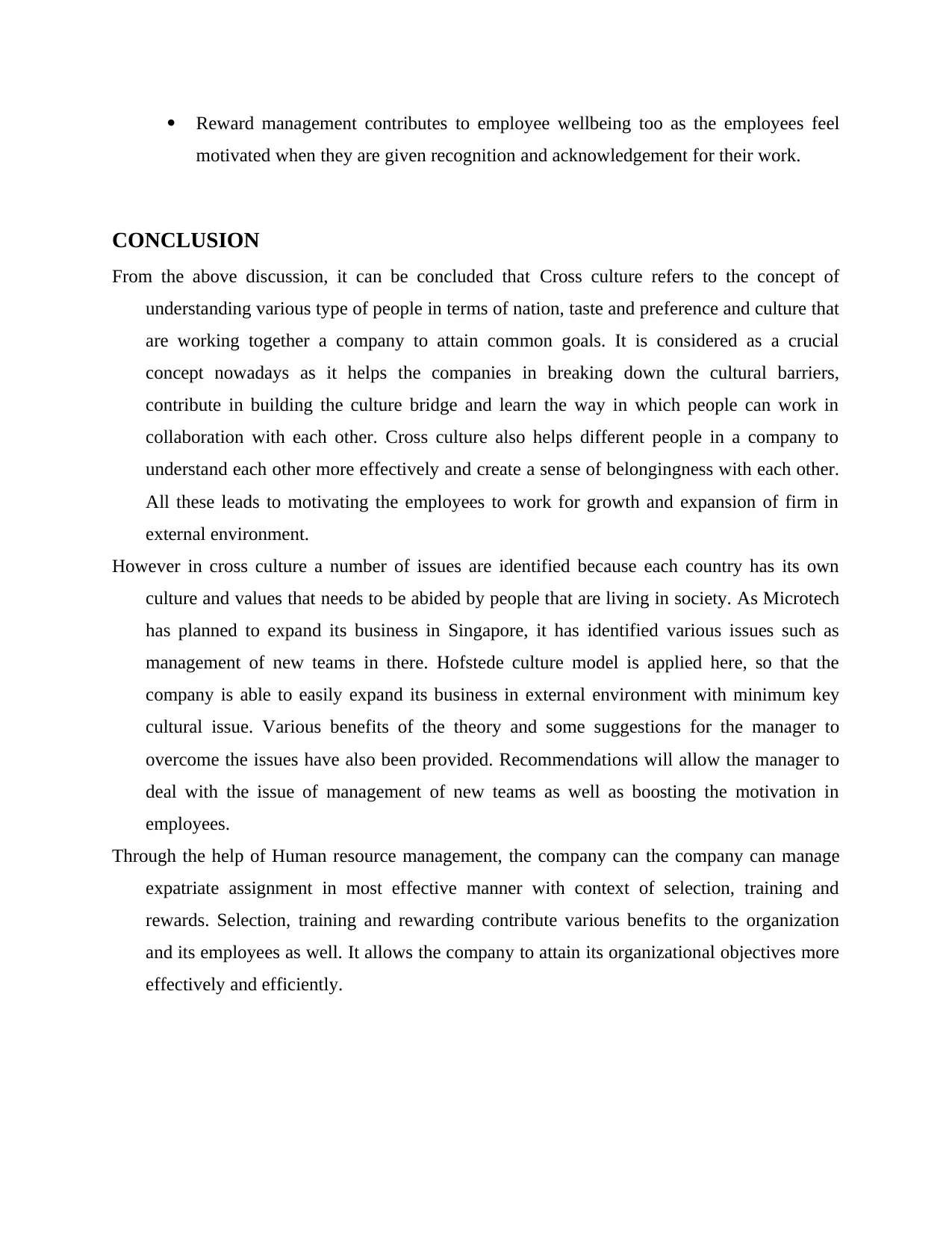
Reward management contributes to employee wellbeing too as the employees feel
motivated when they are given recognition and acknowledgement for their work.
CONCLUSION
From the above discussion, it can be concluded that Cross culture refers to the concept of
understanding various type of people in terms of nation, taste and preference and culture that
are working together a company to attain common goals. It is considered as a crucial
concept nowadays as it helps the companies in breaking down the cultural barriers,
contribute in building the culture bridge and learn the way in which people can work in
collaboration with each other. Cross culture also helps different people in a company to
understand each other more effectively and create a sense of belongingness with each other.
All these leads to motivating the employees to work for growth and expansion of firm in
external environment.
However in cross culture a number of issues are identified because each country has its own
culture and values that needs to be abided by people that are living in society. As Microtech
has planned to expand its business in Singapore, it has identified various issues such as
management of new teams in there. Hofstede culture model is applied here, so that the
company is able to easily expand its business in external environment with minimum key
cultural issue. Various benefits of the theory and some suggestions for the manager to
overcome the issues have also been provided. Recommendations will allow the manager to
deal with the issue of management of new teams as well as boosting the motivation in
employees.
Through the help of Human resource management, the company can the company can manage
expatriate assignment in most effective manner with context of selection, training and
rewards. Selection, training and rewarding contribute various benefits to the organization
and its employees as well. It allows the company to attain its organizational objectives more
effectively and efficiently.
motivated when they are given recognition and acknowledgement for their work.
CONCLUSION
From the above discussion, it can be concluded that Cross culture refers to the concept of
understanding various type of people in terms of nation, taste and preference and culture that
are working together a company to attain common goals. It is considered as a crucial
concept nowadays as it helps the companies in breaking down the cultural barriers,
contribute in building the culture bridge and learn the way in which people can work in
collaboration with each other. Cross culture also helps different people in a company to
understand each other more effectively and create a sense of belongingness with each other.
All these leads to motivating the employees to work for growth and expansion of firm in
external environment.
However in cross culture a number of issues are identified because each country has its own
culture and values that needs to be abided by people that are living in society. As Microtech
has planned to expand its business in Singapore, it has identified various issues such as
management of new teams in there. Hofstede culture model is applied here, so that the
company is able to easily expand its business in external environment with minimum key
cultural issue. Various benefits of the theory and some suggestions for the manager to
overcome the issues have also been provided. Recommendations will allow the manager to
deal with the issue of management of new teams as well as boosting the motivation in
employees.
Through the help of Human resource management, the company can the company can manage
expatriate assignment in most effective manner with context of selection, training and
rewards. Selection, training and rewarding contribute various benefits to the organization
and its employees as well. It allows the company to attain its organizational objectives more
effectively and efficiently.
Paraphrase This Document
Need a fresh take? Get an instant paraphrase of this document with our AI Paraphraser
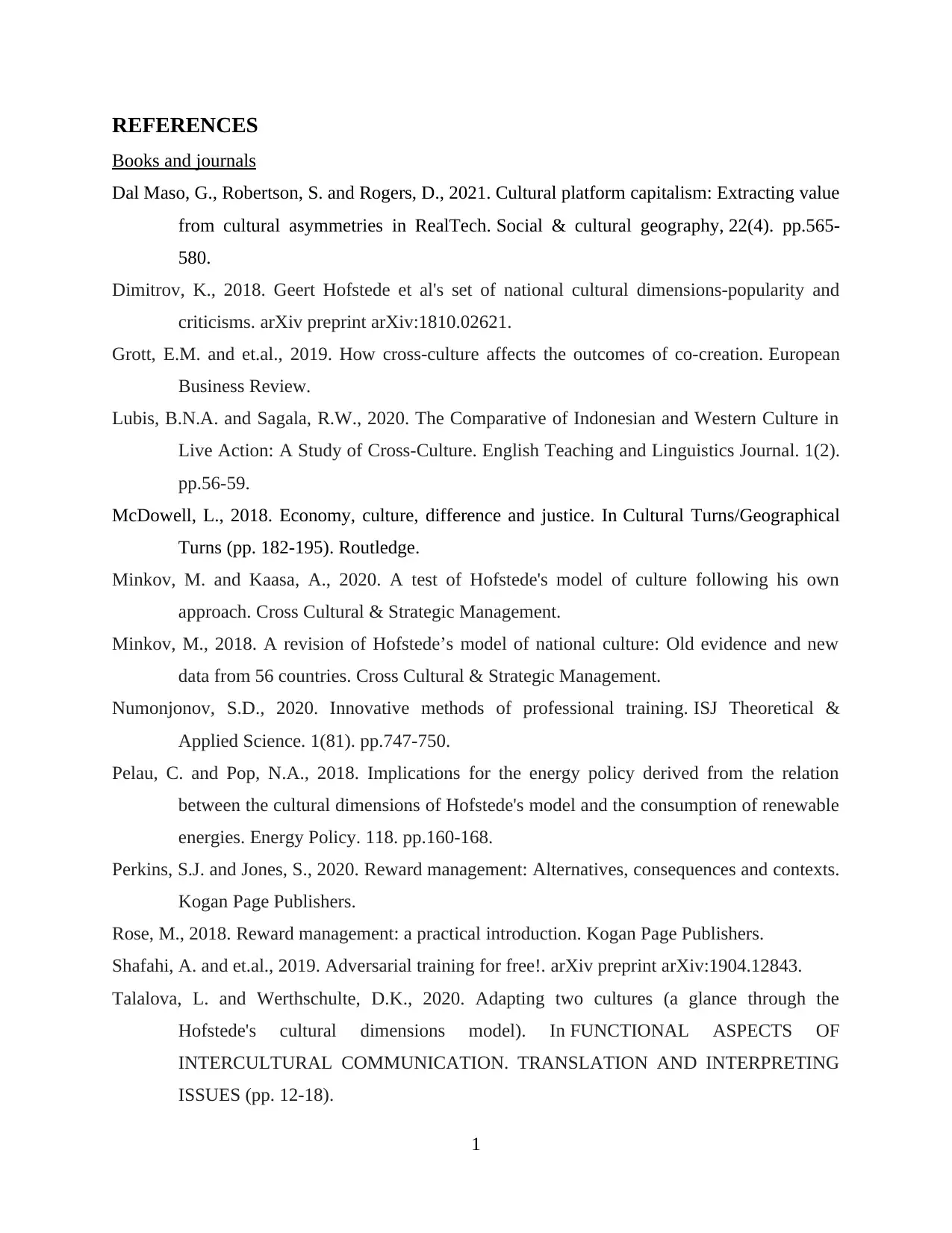
REFERENCES
Books and journals
Dal Maso, G., Robertson, S. and Rogers, D., 2021. Cultural platform capitalism: Extracting value
from cultural asymmetries in RealTech. Social & cultural geography, 22(4). pp.565-
580.
Dimitrov, K., 2018. Geert Hofstede et al's set of national cultural dimensions-popularity and
criticisms. arXiv preprint arXiv:1810.02621.
Grott, E.M. and et.al., 2019. How cross-culture affects the outcomes of co-creation. European
Business Review.
Lubis, B.N.A. and Sagala, R.W., 2020. The Comparative of Indonesian and Western Culture in
Live Action: A Study of Cross-Culture. English Teaching and Linguistics Journal. 1(2).
pp.56-59.
McDowell, L., 2018. Economy, culture, difference and justice. In Cultural Turns/Geographical
Turns (pp. 182-195). Routledge.
Minkov, M. and Kaasa, A., 2020. A test of Hofstede's model of culture following his own
approach. Cross Cultural & Strategic Management.
Minkov, M., 2018. A revision of Hofstede’s model of national culture: Old evidence and new
data from 56 countries. Cross Cultural & Strategic Management.
Numonjonov, S.D., 2020. Innovative methods of professional training. ISJ Theoretical &
Applied Science. 1(81). pp.747-750.
Pelau, C. and Pop, N.A., 2018. Implications for the energy policy derived from the relation
between the cultural dimensions of Hofstede's model and the consumption of renewable
energies. Energy Policy. 118. pp.160-168.
Perkins, S.J. and Jones, S., 2020. Reward management: Alternatives, consequences and contexts.
Kogan Page Publishers.
Rose, M., 2018. Reward management: a practical introduction. Kogan Page Publishers.
Shafahi, A. and et.al., 2019. Adversarial training for free!. arXiv preprint arXiv:1904.12843.
Talalova, L. and Werthschulte, D.K., 2020. Adapting two cultures (a glance through the
Hofstede's cultural dimensions model). In FUNCTIONAL ASPECTS OF
INTERCULTURAL COMMUNICATION. TRANSLATION AND INTERPRETING
ISSUES (pp. 12-18).
1
Books and journals
Dal Maso, G., Robertson, S. and Rogers, D., 2021. Cultural platform capitalism: Extracting value
from cultural asymmetries in RealTech. Social & cultural geography, 22(4). pp.565-
580.
Dimitrov, K., 2018. Geert Hofstede et al's set of national cultural dimensions-popularity and
criticisms. arXiv preprint arXiv:1810.02621.
Grott, E.M. and et.al., 2019. How cross-culture affects the outcomes of co-creation. European
Business Review.
Lubis, B.N.A. and Sagala, R.W., 2020. The Comparative of Indonesian and Western Culture in
Live Action: A Study of Cross-Culture. English Teaching and Linguistics Journal. 1(2).
pp.56-59.
McDowell, L., 2018. Economy, culture, difference and justice. In Cultural Turns/Geographical
Turns (pp. 182-195). Routledge.
Minkov, M. and Kaasa, A., 2020. A test of Hofstede's model of culture following his own
approach. Cross Cultural & Strategic Management.
Minkov, M., 2018. A revision of Hofstede’s model of national culture: Old evidence and new
data from 56 countries. Cross Cultural & Strategic Management.
Numonjonov, S.D., 2020. Innovative methods of professional training. ISJ Theoretical &
Applied Science. 1(81). pp.747-750.
Pelau, C. and Pop, N.A., 2018. Implications for the energy policy derived from the relation
between the cultural dimensions of Hofstede's model and the consumption of renewable
energies. Energy Policy. 118. pp.160-168.
Perkins, S.J. and Jones, S., 2020. Reward management: Alternatives, consequences and contexts.
Kogan Page Publishers.
Rose, M., 2018. Reward management: a practical introduction. Kogan Page Publishers.
Shafahi, A. and et.al., 2019. Adversarial training for free!. arXiv preprint arXiv:1904.12843.
Talalova, L. and Werthschulte, D.K., 2020. Adapting two cultures (a glance through the
Hofstede's cultural dimensions model). In FUNCTIONAL ASPECTS OF
INTERCULTURAL COMMUNICATION. TRANSLATION AND INTERPRETING
ISSUES (pp. 12-18).
1
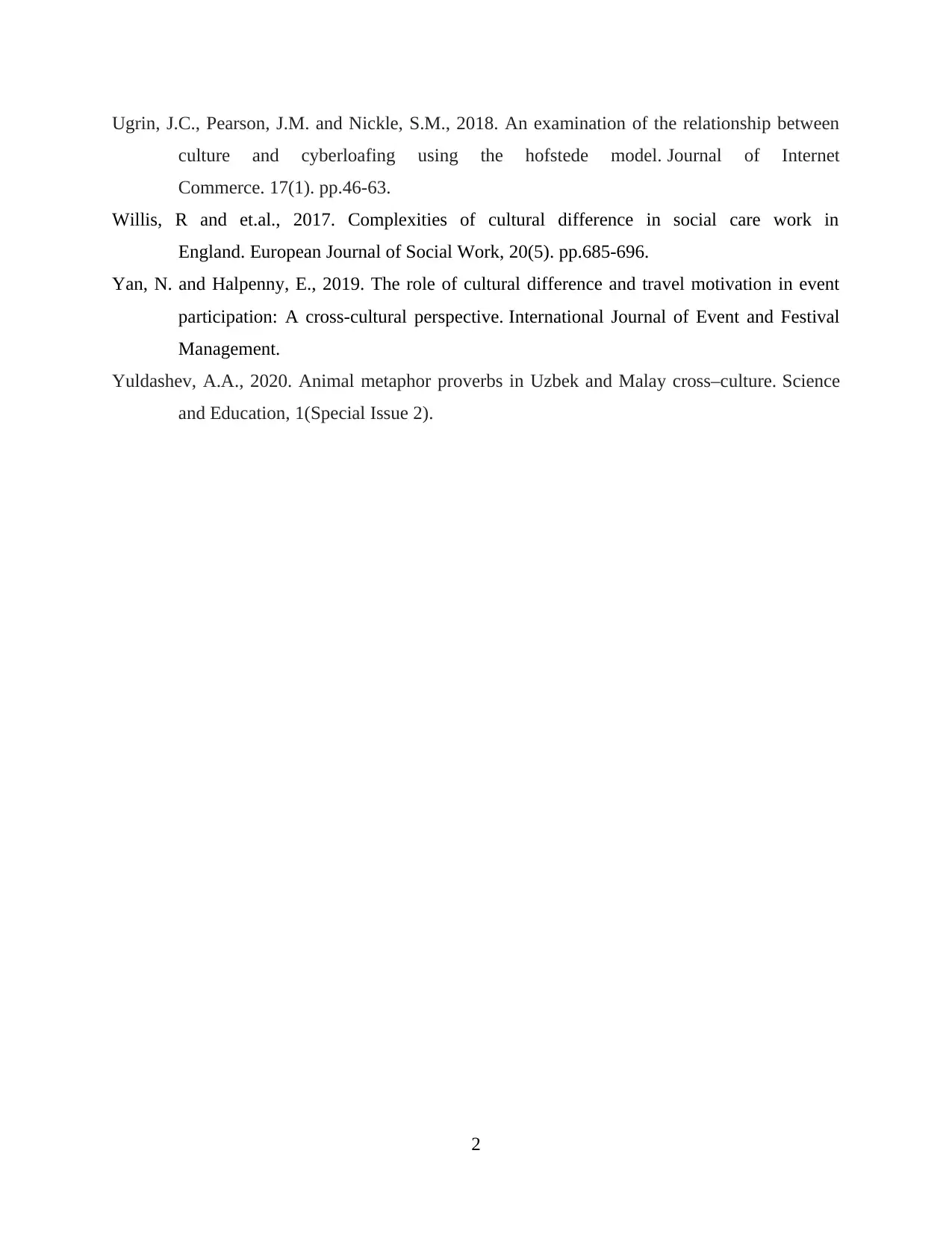
Ugrin, J.C., Pearson, J.M. and Nickle, S.M., 2018. An examination of the relationship between
culture and cyberloafing using the hofstede model. Journal of Internet
Commerce. 17(1). pp.46-63.
Willis, R and et.al., 2017. Complexities of cultural difference in social care work in
England. European Journal of Social Work, 20(5). pp.685-696.
Yan, N. and Halpenny, E., 2019. The role of cultural difference and travel motivation in event
participation: A cross-cultural perspective. International Journal of Event and Festival
Management.
Yuldashev, A.A., 2020. Animal metaphor proverbs in Uzbek and Malay cross–culture. Science
and Education, 1(Special Issue 2).
2
culture and cyberloafing using the hofstede model. Journal of Internet
Commerce. 17(1). pp.46-63.
Willis, R and et.al., 2017. Complexities of cultural difference in social care work in
England. European Journal of Social Work, 20(5). pp.685-696.
Yan, N. and Halpenny, E., 2019. The role of cultural difference and travel motivation in event
participation: A cross-cultural perspective. International Journal of Event and Festival
Management.
Yuldashev, A.A., 2020. Animal metaphor proverbs in Uzbek and Malay cross–culture. Science
and Education, 1(Special Issue 2).
2
1 out of 15
Related Documents
Your All-in-One AI-Powered Toolkit for Academic Success.
+13062052269
info@desklib.com
Available 24*7 on WhatsApp / Email
![[object Object]](/_next/static/media/star-bottom.7253800d.svg)
Unlock your academic potential
© 2024 | Zucol Services PVT LTD | All rights reserved.





